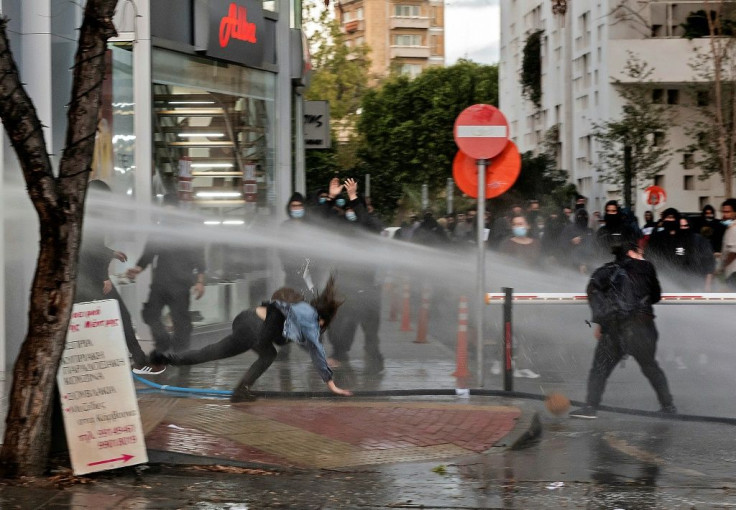Cyprus To Probe Police Force Against Protesters
Cyprus green-lighted an independent investigation on Monday after police were accused of using excessive force against protesters, leaving one woman reportedly needing eye surgery.
Police used water cannon and tear gas in Nicosia on Saturday as hundreds held an initially peaceful protest against government corruption and coronavirus restrictions.
Attorney-General George Savvides gave the go-ahead Monday for an independent watchdog to appoint criminal investigators to probe accusations of police brutality, his office said in a statement.
Savvides would then rule on whether any prosecution is warranted, it added.
Several groups including left-wing activists and trade unions had called for the protest against official corruption, notably over a controversial "golden passport" scheme that was scrapped last year.
They also voiced anger over the government's response to the coronavirus pandemic, which has battered the Cypriot economy and triggered stringent, ongoing lockdown restrictions.
As police moved to break up the demonstration, musician Anastasia Demetriadou was knocked to the ground by a water cannon and wounded in her eye, according to her social media.
"Police used a water cannon to attack me because I was dancing peacefully on the sidewalk. I have a serious eye injury and I need surgery, but I don't regret anything!" Demetriadou wrote on Facebook.
She also posted a picture of herself with a black eye.
An AFP journalist who witnessed the incident said Demetriadou had been dancing during the protest on a major avenue in central Nicosia.
She and other protestors were shouting and gesturing at the police but were not throwing anything when the water cannon hit her in the face, knocking her to the ground.
Seconds later, after fellow protesters dragged Demetriadou around a corner and out of range of the cannon, over 20 riot police charged to chase protestors down the street where she was lying.

Police later told AFP that 10 people had been arrested for "public affray and causing a disturbance" during the protest, which was held in defiance of coronavirus restrictions.
The ensuing clashes sparked a public outcry on the Mediterranean island, with images widely shared on social media.
Police spokesperson Christos Andreou told the Cyprus News Agency that the watchdog's involvement would ensure an "objective and impartial" examination of Saturday's events.
Justice Minister Emily Yiolitis said the police had not been instructed to use force.
"Extreme behaviour has no place in the police and the investigation will be thorough. Officers found to have committed such acts will be held accountable," Yiolitis told reporters Monday.
"Yes, there is a ban on demonstrations, but this does not mean the police can respond with violence."
Alexandra Attalides, a former European Parliament press attache who attended the protest, told the Financial Mirror news website she believed police had been "there ready for a conflict, rather than being there to supervise the event and keep the peace".
The police said water cannon was used after protesters started "throwing stones and other objects" at officers.
An AFP journalist saw dozens of riot police and the water cannon deployed from near the beginning of the initially peaceful protest, where children and disabled people were present.
Some protestors later threw oranges and water bottles after being forced down a side street by police.
© Copyright AFP {{Year}}. All rights reserved.





















